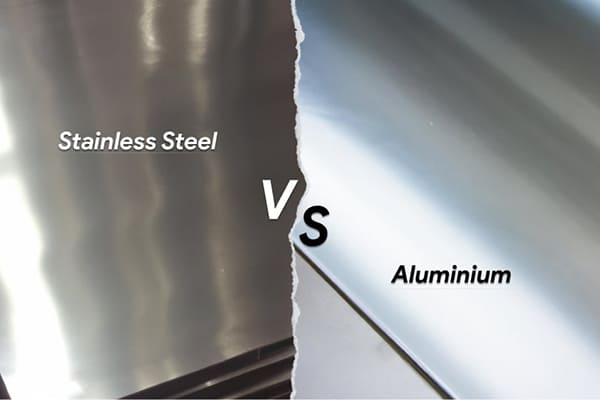When choosing between aluminum and stainless steel for various applications, it’s important to consider several factors, including strength, weight, corrosion resistance, cost, and ease of fabrication. Both materials have their advantages and are suited for specific uses depending on the application requirements.

Aluminum and stainless steel
Aluminum:
Stainless Steel:
Aluminum:
Stainless Steel:
Aluminum:
Stainless Steel:
Aluminum:
Stainless Steel:
Aluminum:
Stainless Steel:
The choice between aluminum and stainless steel depends on the specific requirements of the application. Aluminum is favored where weight savings and ease of fabrication are crucial, while stainless steel is preferred in situations demanding strength, durability, and corrosion resistance. The cost, environmental conditions, and desired lifespan of the product also play significant roles in the decision-making process.
Related:https://aludepot.com/blog/aluminum-vs-stainless-steel/
3003 aluminum sheet is an alloy with very good corrosion resistance and moderate strength, the reason this metal is widely used is because it is affordable and strong.
040 Aluminum Sheet is a type of aluminum sheet that has a thickness of 0.04 inches, which is equivalent to 1.016 millimeters. It is a thin and lightweight material
5005 aluminum sheet is a medium-strength aluminum alloy plate, which can reach medium and high strength by cold working, and it has good formability
3105 aluminum coil is a 3000 series aluminum alloy: the main alloying addition is manganese, which is formulated for primary forming into forged products.
Painted aluminum coil (Coated aluminum coil) is a popular material choice for construction, transportation, and signage due to its lightweight, durability, and versatility.
Anodized aluminum sheet is an aluminum sheet placed in the corresponding electrolyte (such as sulfuric acid, chromic acid, oxalic acid, etc.) as an anode, and electrolysis is performed under specific conditions and the action of external current.
No.52, Dongming Road, Zhengzhou, Henan, China
Henan Huawei Aluminum Co., Ltd, One Of The Biggest Aluminum Supplier In China Henan,We Are Established In 2001,And We Have rich experience in import and export and high quality aluminum products
Mon – Sat, 8AM – 5PM
Sunday: Closed
© Copyright © 2023 Henan Huawei Aluminium Co., Ltd
Latest Comments
Dear Sir, Please offer your best FOB Prices specs are as under ALUMINIUM STRIP (AL=99.50% MIN) SIZE:450 X32 X6 MM. DIN EN 570 EN-AW 1050 A, QUANTITY=3400KG
Hello, Would you be so kind to offer item as follows: Coil 0,6х1250 (1000)mm EN AW-3105 5tons
Hello, Can you offer me Aluminium plates? Actally I need: 110mm x 1700mm x 1700mm 5083 H111 - 21 pcs Next year planed is 177 pcs
Świetny artykuł. Byłem zachwycony, że wyszukałem ten artykuł. Wielu osobom wydaje się, że mają rzetelną wiedzę na ten temat, ale często tak nie jest. Stąd też moje miłe zaskoczenie. Jestem pod wrażeniem. Zdecydowanie będę rekomendował to miejsce i częściej wpadał, aby zobaczyć nowe rzeczy.
requirement of aluminium strip